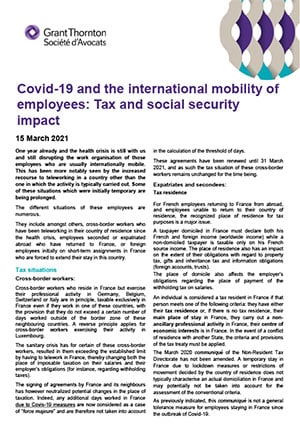-
Tax Policy Management
Tax Policy Management
-
Growth Management
Growth Management
-
Tax audit and litigation
Tax audit and litigation

-
Definition of a strategic and secure transfer pricing structure
Definition of a strategic and secure transfer pricing structure
-
Assistance in the development of international activities and operational reorganisations – “Business restructuring”
Assistance in the development of international activities and operational reorganisations – “Business restructuring”
-
Defense of practices and assistance in the context of tax audits and their follow-up from a litigation viewpoint
Defense of practices and assistance in the context of tax audits and their follow-up from a litigation viewpoint
-
Annual declaration and documentation obligations
Annual declaration and documentation obligations

-
Domestic and international VAT applicable to your company's flow
Domestic and international VAT applicable to your company's flow
-
Banking and financial VAT, VAT in the insurance sector
Banking and financial VAT, VAT in the insurance sector
-
VAT related to real estate registration fees
VAT related to real estate registration fees
-
VAT in the public and non-profit / association sector
VAT in the public and non-profit / association sector
-
Tax audit, tax litigation and relations with the Tax authorities
Tax audit, tax litigation and relations with the Tax authorities
-
Applicable rules for invoicing
Applicable rules for invoicing
-
Customs issues related to your company's international flows
Customs issues related to your company's international flows
-
French VAT registration and compliance obligations
French VAT registration and compliance obligations
-
Payroll tax
Payroll tax
-
Other indirect taxation
Other indirect taxation

-
Company transfer diagnosis
Company transfer diagnosis

-
Distribution strategy : Implementing and structuring
Distribution strategy : Implementing and structuring
-
Distribution activities digitalisation
Distribution activities digitalisation
-
Relations between suppliers and distributors
Relations between suppliers and distributors
-
Contractual policy : etablishing and structuring
Contractual policy : etablishing and structuring
-
Controls and litigation regarding payment terms
Controls and litigation regarding payment terms
-
Organising and securing commercial relations with consumers
Organising and securing commercial relations with consumers
-
Data protection - GDPR
Data protection - GDPR
-
Commercial Leases
Support in the management and contract management of commercial leases.

-
Traditional Services offered
Traditional Services offered
-
Health at work and quality of life at work
Health at work and quality of life at work
-
HR Management Audit
HR Management Audit
-
HR Engineering and People Change
Implementing managerial solutions in line with the company's strategic challenges
-
Management of HR compliance and internal investigations (harassment, discrimination, and whistleblowing)
Management of HR compliance and internal investigations (harassment, discrimination, and whistleblowing)

-
Advice on legal structuring
Advice on legal structuring
-
Day to day company management
Day to day company management
-
Companies reorganisation
Companies reorganisation
-
Mergers & Acquisitions - Private Equity
Mergers & Acquisitions - Private Equity
-
Changes in shareholder structure - Securities issue
Changes in shareholder structure - Securities issue
-
Governance and legal risks management
Governance and legal risks management

-
Development of an international mobility policy
Development of an international mobility policy
-
Coordination of reporting obligations for employees in a mobility situation
Coordination of reporting obligations for employees in a mobility situation
-
Advice on social security
Advice on social security
-
Assistance in labour law
Assistance in labour law

-
Management and protection of your portfolio of property rights
We put the most appropriate protection policy in place for our clients’ intellectual property rights.
-
Securing your projects: advisory and drafting of agreement services
We advise you on the feasibility of your project and the securing of your intellectual property and IT rights.
-
Enforcement of your rights: pre-litigation and litigation
Enforcement of your rights: detection of infringement, pre-litigation and litigation

One year already and the health crisis is still with us and still disrupting the work organisation of those employees who are usually internationally mobile. This has been more notably seen by the increased recourse to teleworking in a country other than the one in which the activity is typically carried out. Some of these situations which were initially temporary are being prolonged.
The different situations of these employees are numerous.
They include amongst others, cross-border workers who have been teleworking in their country of residence since the health crisis, employees seconded or expatriated abroad who have returned to France, or foreign employees initially on short-term assignments in France who are forced to extend their stay in this country.
Tax situations
Cross-border workers:
Cross-border workers who reside in France but exercise their professional activity in Germany, Belgium, Switzerland or Italy are in principle, taxable exclusively in France even if they work in one of these countries, with the provision that they do not exceed a certain number of days worked outside of the border zone of these neighbouring countries. A reverse principle applies for cross-border workers exercising their activity in Luxembourg.
The sanitary crisis has for certain of these cross-border workers, resulted in them exceeding the established limit by having to telework in France, thereby changing both the place of imposable taxation on their salaries and their employer’s obligations (for instance, regarding withholding taxes).
The signing of agreements by France and its neighbours has however neutralized potential changes in the place of taxation. Indeed, any additional day worked in France due to Covid measures is now considered as a case of “force majeure” and is therefore not taken into account in the calculation of the threshold of days.
These agreements have been renewed until 31 March 2021, and as such the tax situation of these cross-border workers remains unchanged for the time being.
Expatriates and secondees:
Tax residence
For French employees returning to France from abroad, and employees unable to return to their country of residence, the recognized place of residence for tax purposes is a major issue.
A taxpayer domiciled in France must declare both his French and foreign income (worldwide income) while a non-domiciled taxpayer is taxable only on his French source income. The place of residence also has an impact on the extent of their obligations with regard to property tax, gifts and inheritance tax and information obligations (foreign accounts, trusts).
The place of domicile also affects the employer's obligations regarding the place of payment of the withholding tax on salaries.
An individual is considered a tax resident in France if that person meets one of the following criteria: they have either their tax residence or, if there is no tax residence, their main place of stay in France, they carry out a non-ancillary professional activity in France, their centre of economic interests is in France. In the event of a conflict of residence with another State, the criteria and provisions of the tax treaty must be applied.
The March 2020 communiqué of the Non-Resident Tax Directorate has not been amended. A temporary stay in France due to lockdown measures or restrictions of movement decided by the country of residence does not typically characterise an actual domiciliation in France and may potentially not be taken into account for the assessment of the conventional criteria.
As previously indicated, this communiqué is not a general tolerance measure for employees staying in France since the outbreak of Covid.
An employee’s stay in France that continues to last will have to be increasingly documented in order to justify that it is really a consequence of the impossibility to return to the original State of residence and that this is not also motivated by personal reasons.
The updated observations by the OECD in February show that most countries maintain the same position in only excluding from the conventional criteria those stays on their territory which are solely related to restrictions of movement.
Non-resident and the rule of 183 days
Even as a non-resident, an individual’s salary could become taxable in France if the person teleworks and has stayed in the country for more than 183 days as a non-resident.
Observations by the OECD now state that where an employee works in a state because of travel restrictions, it would be reasonable for the days spent in that state related to those circumstances not to be counted nor included in the 183 days. The OECD cites several states that have adopted measures to this effect.
The French tax administration has not specifically communicated on the subject. Based on existing comments on the method of counting days (sickness days are taken into account unless they prevent the employee from leaving when he or she would normally have been entitled those days related to the travel restrictions). However, a communication would have the merit of making the calculation of this threshold more certain.
Concerning Social Security
Within the European Union, an employee is subject to the legislation of the State where he/she carries out his/her professional activity. If the worker carries out the professional activity in several Member States, he/she is then subject to the legislation of the State of his residence provided that he carries out a substantial part of his activity there.
The fact to have teleworked in a State other than the State where the activity is usually carried out since the beginning of the crisis can modify the social security regime applicable for cross-border workers. This can also be the case for employees who were seconded from a State of the European Union or who worked across several States in their profession.
At a Member State level, a consensus was reached to neutralize the effects of a change in workplace during lockdown measures, without any particular formalities in place. This tolerance makes it possible to avoid the need for registration of the employer and the employee in the newly competent country when the situation is in fact temporary. This is still in force for the time being and should be applicable a priori until June 2021.
For those employees who prior to Covid-19 worked outside the European Union and who have returned to France, certain formalities have to be carried out by the employer depending on whether or not an agreement is in place between the country of origin and France in order to secure the applicable tax regime.
The measures taken to mitigate the effects of a change in the State where the activity is exercised by the employee are still in force.
However, particular attention should be paid to the scope of these measures in the event where employees have, or have had, the possibility to return to the State in which they usually exercise their activity. In such cases, the tax and social security reviews of a worker’s situation have to be carried out as the situation regarding the obligations of the employer and the employee may have changed completely as a result.


















